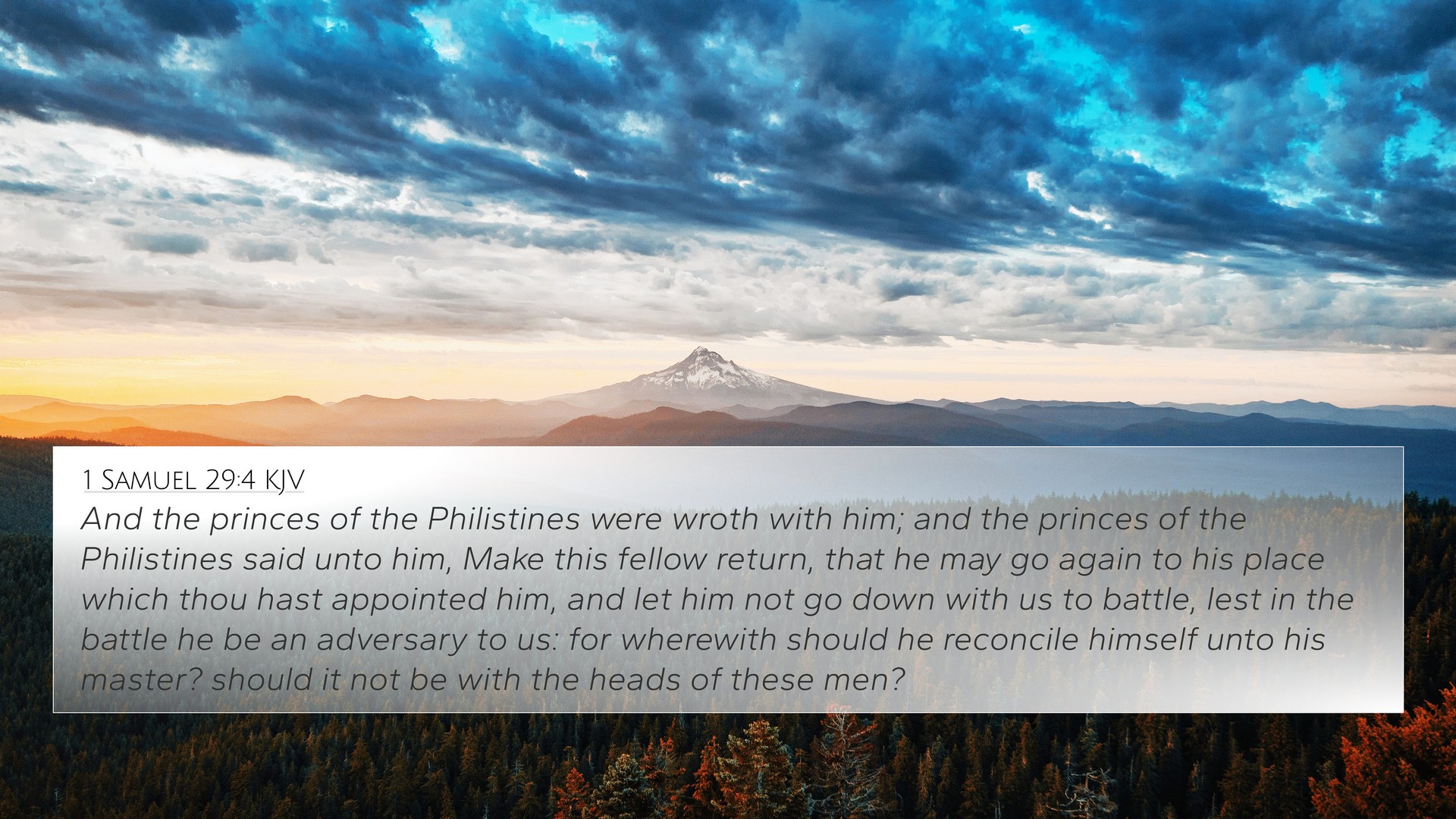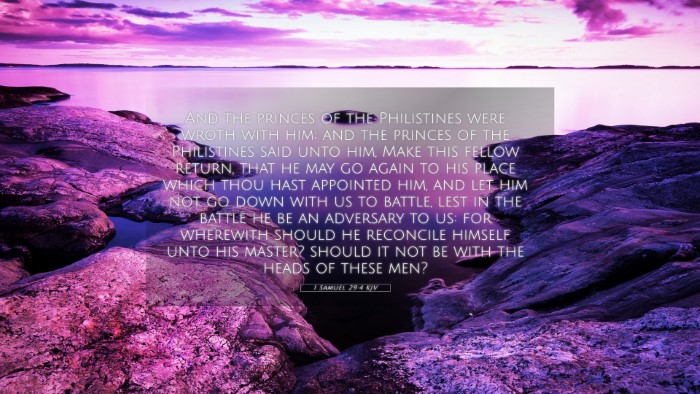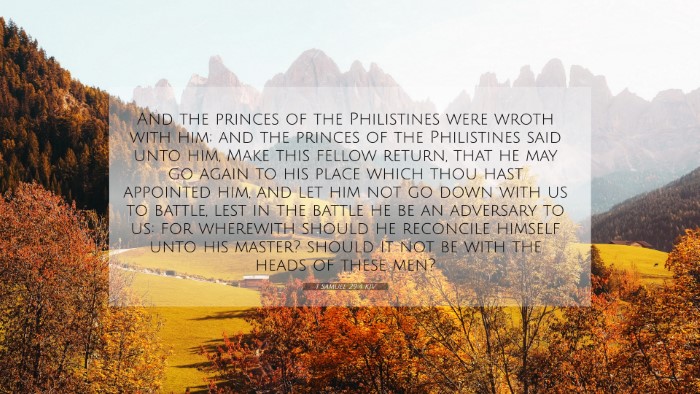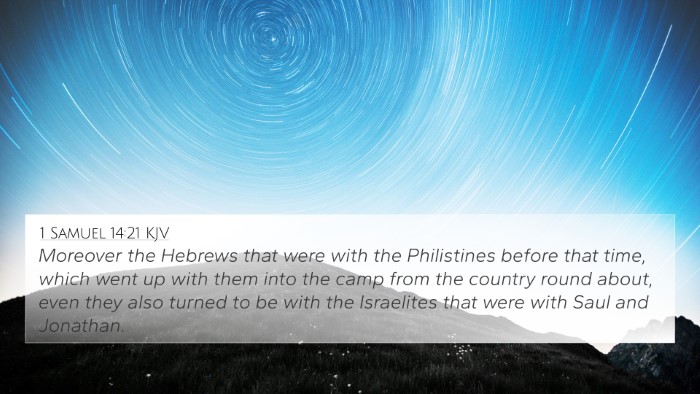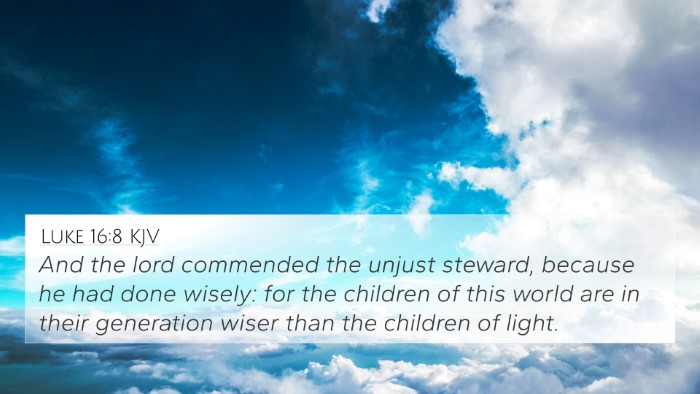Understanding 1 Samuel 29:4
Overview: 1 Samuel 29:4 captures a significant moment in the narrative of David and his experiences with the Philistines. In this verse, the Philistine leaders express their concern about David's presence among them as they prepare for battle against the Israelites. This moment highlights the complexities of alliances and loyalty that permeate the biblical narrative.
Verse Text
“But the princes of the Philistines were wroth with him; and the princes of the Philistines said unto him, Make this fellow return, that he may go again to his place which thou hast appointed him, and let him not go down with us to battle, lest in the battle he be an adversary to us: for wherewith should he reconcile himself unto his master? should it not be with the heads of these men?” (1 Samuel 29:4, KJV)
Commentary Insights
Interpretation by Matthew Henry
Matthew Henry suggests that the concern of the Philistine princes reflects their fear of David potentially turning against them. They perceive David not just as a warrior but as a possible traitor who might seek to win back favor with Saul by defeating his own countrymen. This concern illustrates the delicate dynamics of trust in wartime alliances.
Insights from Albert Barnes
Albert Barnes elaborates on the political ramifications of David’s situation. He notes that the princes’ objection underscores their doubt about David's loyalty. They fear that during the battle, he might betray them, demonstrating the precarious nature of David's position and the fine line he walks between two opposing sides.
Discussion by Adam Clarke
Adam Clarke emphasizes the irony of David's situation. Once a fugitive from Saul, he now finds himself within the ranks of Israel's enemies. Clarke points out that the Philistine leaders' mistrust serves as a poignant reminder of how reputation can precede one's actions, influencing others’ perceptions and decisions.
Thematic Connections
This verse can be seen as part of a larger theme of loyalty, trust, and betrayal that runs throughout the Bible. David's situation encapsulates the complexities of human relationships and the implications of choices made within those contexts.
Cross References
- 1 Samuel 27:2-3 - David serves Achish, illustrating his precarious alliance.
- 1 Samuel 30:1-6 - David's loyalty and leadership as he returns to Ziklag after the Amalekite invasion.
- 1 Samuel 28:17-19 - Saul's desperation and the involvement of the witch at Endor parallels David's struggles for assistance.
- Psalm 34:19 - David's recognition of the troubles of the righteous relates to his experiences.
- 2 Samuel 1:1-16 - The account of Saul's death reflects the shifting alliances in Israel.
- Proverbs 24:21-22 - A warning against rebellion and matters of loyalty relevant to David's situation.
- Matthew 10:34-36 - Jesus speaks on division, reminiscent of David's divided allegiance between kings.
Applying Cross-Referencing Tools
For individuals seeking to delve deeper into the themes and connections highlighted in 1 Samuel 29:4, utilizing a Bible concordance can facilitate the identification of related scripture. Cross-reference Bible study methods allow for a comparative analysis of similar themes across various verses, enriching one's understating of spiritual and historical contexts.
Conclusion
In summary, 1 Samuel 29:4 provides a reflection on the tenuous nature of alliances and the fears engendered by past loyalties. By engaging with this verse through Tools for Bible cross-referencing, believers can uncover a wealth of connections, enriching their understanding of biblical narratives and the lessons they impart.
